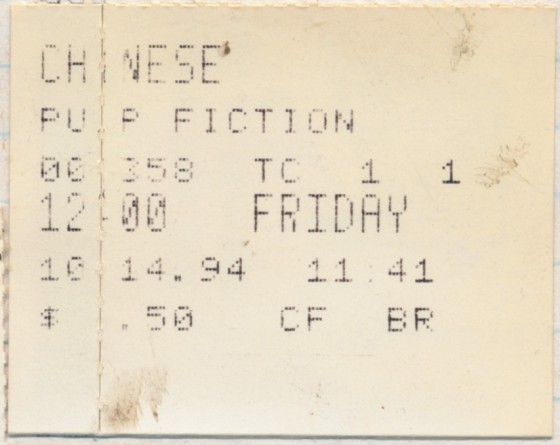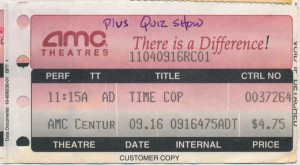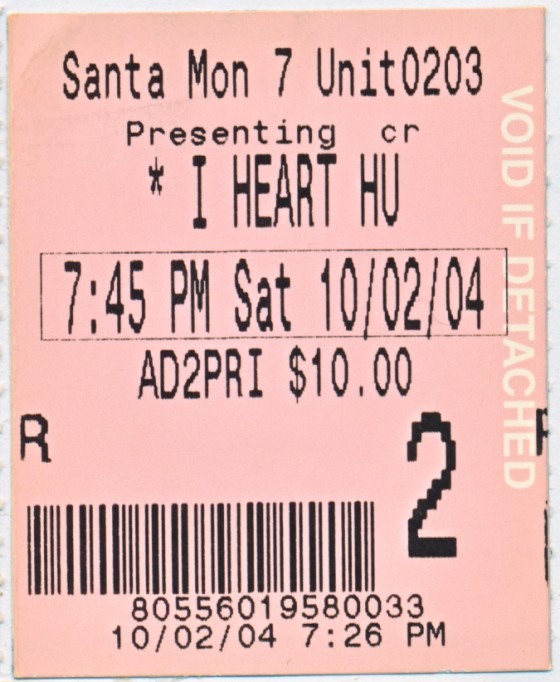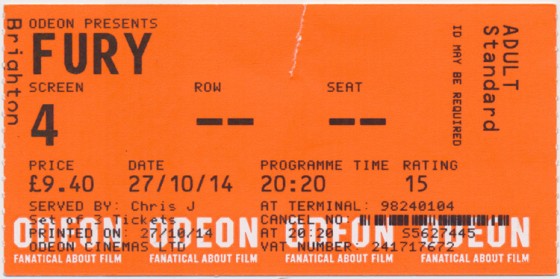
Having to Explain Irony
As one might surmise from a website dedicated to movie tickets, its proprietor prefers seeing films in the cinema. With movies like It Follows or even Gravity, it’s almost a requirement; you’re not allowed to pause, and that matters. In your Godzillas and Battleships, you’re going to learn something, or get some cool effects, or laugh at someone’s deranged intentions. Hugo or White God or Foxcatcher or Evil Dead (2013) are unendurable, but they confer a kind of honor. The ticket is my purple heart: I survived Dawn of the Planet of the Apes. These films have also seemingly provided the opportunity to make fun of soldiers in extremely bad taste. No one would ever dare, which means there’s probably a medal for that too.
Hey, I get another medal!

But I see a lot more movies on tape now, which is the term I will continue to use, like film, mix-tape, album and feminism, even though their technologies have long since been supplanted. I live in the UK, and soon (fine, now) France, so my choices are limited. I prefer the film experience, but I’m lazy, and can’t be bothered to drive somewhere, pay someone some money and sit down for two hours only to, drink coffee, eat cakes and write excuses for not wanting to go see movies in the theater. What? I can’t do this at home – that’s where I watch movies!
And so the recent iTunes rental of Accidental Love, which is never coming out here. I like Mr. David O. Russell, and the fact the critics were unkind intrigued me. But I did as we do when we rent and have the option: shut it off about ten minutes in. Maybe that’s why I like the theater. It allows me to get in trouble again with another offensive to the military metaphor. Theaters are the Vietnam of media. I spent my ten bucks, and I ain’t leaving. I don’t care what my advisors say, godammit, I want my democratic election in a country unable to reconcile artificial barriers put in place by a post-colonial settlement.
Should have put in a spoiler alert. I just assume that everyone’s seen Chairman of the Board.
Unlike a film critic, not seeing Accidental Love will prevent me from reviewing it. It will not, however, prevent me from talking about it. The film, or rather the first ten minutes, get to the heart of what makes movies good. Mr. Roger Corman looked for tits and gunplay, I look for wit. Sometimes you can be tricked by something that drops the ball; Cabin in the Woods is good, very good, and then it fails awfully. But movies are like Vietnam in yet another way: bad ones very, very rarely get better. You know almost right away, and you’re almost always right.
There’s a reason for this, and it’s because the story, for whatever I have said in the past, doesn’t matter. Great concepts are fine, but using Shakespeare as our go-to, do we really want to see the tale of a guy killing another guy, and then the son taking a very long time for revenge? And we didn’t even see him kill the other guy! What the hell?
Sometimes great films, like Spring Breakers or Pulp Fiction (to which we will shortly get), have the blandest possible stories, you know, like terrible films do. Sometimes, as in the case of The Matrix and Groundhog Day, great films have original concepts to match, but original concepts could not save The Zero Theorem or even Twilight, which suck it up, is an original concept; given the explosion of convenient and forgettable characters, and the way in which the vampires are ‘stone lubricated by venom‘. It is perhaps too original, something which I’m sure has never been said about the series.
Take it in the opposite direction, and you have films like Nostaghia or Ali: Fear Eats the Soul or even The Possibilities Are Endless, films which have virtually no story, and which work entirely on their compelling, can’t tear your eyes away painterly quality.
So movies like Quiz Show, The Big Lebowski, Stalker, Bringing Up Baby, Aliens, Remains of the Day, Reprise, Diary of a Country Priest, Ringu, Week-End, Konets Sankt-Peterburga, Notorious, Silence of the Lambs, Naked Lunch, Police Story 3, Evil Dead 2 are all the same, because they are all, well…funny. That is to say, they compel us, and all in the same way. We just need to better define what a joke is. The problem isn’t that I’m wrong, or that I’m using terms that are in no way suited the task. The problem, as is so often the case, is everyone and everything else.
Dissecting a joke about a frog
What, then, is a joke? I read the following by Mr. Jimmy Carr, who quotes Mr. Jerry Seinfeld:
(who in turn) compares telling a joke to attempting to leap a metaphorical canyon, taking the audience with him. The set-up is the nearside cliff, and the punchline is the far side. If they’re too far apart, the listeners don’t make it to the other side. And if they are too close together, the audience just steps across the gap without experiencing any exhilarating leap.
I must like this idea a lot; I spent almost an hour regoogling for it (if that’s not a term, it should be. ‘Regoogling’ refers to compulsive shoulder-crunching act of trying to find a lost article, image or bit on the internet, that you’re totally, almost totally, now you’re getting less, no, you’re totally sure you saw. The problem isn’t that the internet is replacing our memory, it’s remembering that this is now the case).
In any case, it seems Mr. Carr would make a good academic. As with 90% of the cites I checked for my thesis, there is no sign that Mr. Seinfeld ever said this. When I encountered a similar problem with an idea I attributed to Mr. Quentin Tarantino but couldn’t verify, I split the difference and called it the Second Peter Hyams Rule. Since we split the difference last time, we’ll have to square it this time, and call it The Timecop Effect.
This has the double advantage of being confusing, and excluding everyone who hasn’t seen Timecop. In said Timecop, if you encounter your past self, you disappear like a befuddled looking Mr. Ron Silver. I don’t know if this happens in time travel, largely because time travel doesn’t exist, but that doesn’t mean it’s not like Timecop. Somehow it’s like Timecop. Wit, then, is when two absolute and incontrovertible truths occupy the same space in your brain and create a frission, a laugh, a gasp, or, in Ron Silver’s case, a ‘whoosh’. It is furthermore, a film, and I swear to God I just remembered this, directed by Mr. Peter Hyams. So technically speaking, this is the Third Peter Hyams Rule.
From this, a joke can be anything, unless it’s about Peter Hyams apparently. But for the sake of clarity from someone referring a movie no one’s seen, let’s call it a gag. This is, naturally, in reference to another film really no one has seen: Grand Canyon. Mr. Steve Martin plays a thinly veiled Mr. Joel Silver, and as watches the dailies, the following exchange takes place. Cursing the internet before, let us praise it for – how big is this thing anyway – containing the script to Grand Canyon:
– You took out the shot.
– Which shot is that?
– The money shot. The bus driver’s head. The brains-on-the-window shot…Put it back. How’s the rear-view-mirror gag supposed to work without it?
I have a fondness for this film, even though it isn’t very good, because of my interconnected fondness for Mr. Silver’s films. Mr. Silver, fictionalized or otherwise, given his production variously of Die Hard, Kiss Kiss Bang Bang, The Matrix, and Lethal Weapon, gets what a gag is. It is often erroneously demarcated ‘trailer moment’, but trailer moments are only a tiny subset. Trailer moments don’t need a whole film to set them up; gags need the brains on the window for the money shot.
Sidenote: I know killing an audience is an oft discussed metaphor for standup, as in ‘he killed’, ‘she destroyed them’. It follows, then, that in order to get away with the crime, they must silence the audience first, hence ‘gag’ or ‘bit’. The thrills of performing in front of a dead, mute audience currently escape me.
A gag, then, is two impossible truths squished together. Examples include something you’ve never seen before, like bullet-time in The Matrix, or a train coming towards you in an 1898 Paris movie theatre. It’s coming towards the screen! We’re all going to die!
The point being that sometimes a gag is merely something that has never been in a movie, and then is. It still works as a joke does: the movie reality in our heads conflicting with the movie we’re watching.
This type of gag acts a litmus test for the theory, as one truth (‘you can’t do that in a movie!’) soon diminishes when, in fact, having seen it, you now know that you can. Bullet-time in The Matrix is fun, even the second and third time. Bullet-time in Swordfish, also a Silver joint, is a depressing reminder that you’re watching Swordfish.
Sometimes, a gag is what it is, a good joke. You can read me being wrong about this here, but Mr. John Water’s joke, possibly the funniest of all time, bears repeating. Overheard in his native Baltimore:
“Daddy, why is Mommy crying?”
“Because you’re an asshole!”
I originally said that this was a collision between your image of parents, and the reality of parents, but the better explanation is that there are two Ron Silvers in this joke and in your head (an image I want to stay with you): parents have to love you, but they also have to hate you.
Despite what I said before about being wrong, I’m also right, because a gag can work within the story. Recall when Ms. Emily Blunt tells a befuddled Mr. Cruise in All You Need Is Kill ‘Find me when you wake up’. I’m very sure I said, loudly, in a crowded theater (less sure about this, but it’s quite possible that I stood up and pointed with my finger on the emphatic): ‘Now that’s an act break’. We realize that Mr. Cruise is not alone, just as the moment, and the film, transforms her death into something desirable. This is what Joel Silver means by gag. This moment is in the trailer, but it doesn’t work there. It works in the film.
Here’s a weird one, akin to G-N Tarkovsky and Hr. Fassbinder: Once Upon a Time America recently came out on BluRay, the long version. Now, I hate director’s cuts, and this is no different: a film not made better by length (though technically the rapey-ness has been proportionally diluted by approximately 37%. It was 1984! The studio couldn’t cut out the rapey-ness!). But longer can also mean better because of all the insane beautiful Old New York shit which has, in the interceding thirty years, been utterly destroyed by, well, by you actually. This is another bridged gap, and an appealing one: peeping into time. There’s no CGI. Like Heaven’s Gate, they built 1900, and it’s fucking cool.
For some people who are not me, it’s the performance of an actor, transcending the gap between all those cameras and lights and the fact that you’re watching it on your phone and they made it real anyway. I don’t get this, or care that much, but I begrudgingly acknowledge that people do.
But my not getting it demonstrates how taste (and jokes) actually work: according to personal truths. Nothing is true, including this, yes, but that doesn’t mean we can’t believe something is from one moment to the next. Our attempts to make sense are only unique in their specificity; they are pedestrian in their form. I’m aware that Bourdieu thinks that taste is some type of class dealie, and given my hatred of film critics, I’m inclined to any critique of High Culture. But if it’s critique, how do make a critique of critiquing without…ahhh!
What Bourdieu misses, and I don’t, is that it feels good to criticize. Bourdieu enjoys mocking the rich as much as they (ahem, I) like making fun of him. This is why there are still Marxists: they find the class struggle funny. And now everyone can!
Some people like The Sarah Silverman Show and some like Black-ish, some both and some neither. This is according to what we find funny, and what we find funny is according to (at least) two things we find true. Whatever it is, funny, cool, moving, compelling, there’s always something being bridged, like two poles in a Jacob’s ladder arcing with lightning. That’s the best explanation you’re going to get, and any explanation that uses the word ‘Timecop’ six times is six times better than any other explanation.
So when you’re in the theatre, what matters in movies isn’t so much whether it makes sense or has characters or story. Flaws, like The Matrix‘s grasp of the 2nd Law of Thermodynamics, or that nothing actually happens in Raiders of the Lost Ark, are in all films. You just tend to notice them if you’re bored out of your mind and have a pad of paper.
What keeps you in are the gags. The film gets you because it gets you. It’s a line, a scene, a look, a shot, and, best case, a chain of all these, that makes you want to see and experience it again. Its charge may diminish, like Arrested Development did God help me nine times through. But the reason it worked so long is because unlike what have or haven’t seen before in a film, a joke is based on two truths that we can’t, or don’t want to, shake.
Like the parents we’re supposed to have and the parents we got (certainly a theme in AR), Gengi takes her drinking as Homer Simpson takes his donuts: with pride. And like when Homer is able to eat his way out of a situation, I cheer a little when Ms Walters manages to outdrink someone half her age. We’re supposed to be ashamed of our sins, but what if we’re good at them? Comedy repeats better because the gap between what is secretly linked can be seen repeatedly, after the truths go back to their respective corners.
Because examples are good or whatever, and my writing tends to assume that people are reading my mind, here are three case studies. Besides Timecop (now eight times!) of course. My conversion to the cruciality of wit for movies was stirred by temporarily mixed events. The now long ago screening of the extremely poor Cold in July was followed by a discussion with a friend about Pulp Fiction, which not only came out twenty years earlier, but what Cold in July makes seem another galaxy. Then, the article, as they often do, stewed a bit, and I got into it with my friend Sarah about our mutual love of I ♥ Huckabees, released temporarily halfway between these two films, but now, speaking of the now of this actual sentence, they were all together. These films are miles apart in every conceivable way, and yet they demonstrate the simple axiom: what makes a film good is that it’s good.


Pulp Fiction, at least according to me four months ago, is a terrible film. The conversation with my friend Paul went something like this. He said, ‘I’m wrong about this subject, but I’m also wrong about this other subject. I would be able to realize my wrongness, but I happen to be in error about a third subject.’ This was followed by my response: ‘You’re wrong; I don’t think you would realize it’. Basically, we were both convinced of our perfect insights, and then we started talking about doggies.
Nevertheless, Paul’s theory was that the structure of Pulp Fiction was revolutionary. It’s cool, and it works, but hardly new (we could say that the quest for the new is a dangerous quest indeed). I make my case here, out of the way of any chance of argument, that many films have used a non-linear structure, not least-ways Citizen Kane. It’s not a new idea, not even in a crime film, with Mr. Kubrick’s best The Killing being just one.

First screening, opening day, at the Chinese. You were probably spending time with your family. Hah!
Broken down, the story of Pulp Fiction ain’t no great shakes. A man and woman rob a diner. A boxer rips off a mobster. Some guys kill some other guys, and then one more. And yet, it’s, well, pretty great, and possibly timeless. It works, as does all of Mr. Tarantino’s best work, not on the back and forth structure, not on the story, but on the fact the writing is funny and constantly surprising. Example: a stupid movie would have used a believable MacGuffin to get Mr. Bruce Willis back to his apartment, something vital that he absolutely has to have. A smart movie uses a stupid one (the watch), and then adds a totally unnecessary, but simultaneously unforgettable Walken cameo.
It contains a perfect definition of the Timecop effect in that a gag applies to anything that works, anything that sings between two places in our head. We all remember when Mr. Willis, having survived one of the most indescribable nights of bondage, rape, murder and mobster forgiveness, returns to his hotel, only to have a Sra. Maria de Medeiros chastise him for yelling at her. This is a perfect collapse: The Hero’s Return colliding with the mundane. It’s not funny because it’s true; it’s funny because it’s true twice at the same time. Again, this is not a trailer moment – it only works if you’ve seen the whole movie.
Like Shakespeare, or at least our reaction to it, all the ripoffs that came after Pulp Fiction stole the structure but not the wit. I would have certainly rather seen a romantic comedy set in a 2111 global wasteland with the attention to writing good gags, than all the 1990s eye sandpaper that arose as a result of stealing non-linear talky crime films. Story is mechanical, xeroxable, which explains the existence of those terrible writing books, and the terrible writing that emanates from them. Wit, as we have seen demonstrated in the roller coaster of quality in even the best artists, is a lightning strike…
$27.00
…sort of (this is a continuation from the previous ellipse). There’s an argument to be made that wit requires an editor, the recognition after the fact that the lightning strike might just be St. Elmo’s Fire, a clunky metaphor from some Joel Schumacher film. Batman and Robin I think it was called.
I never watch Director’s Cuts, except with all the tape I’m watching, now I do. Terminator 2: Judgement Day, a very fine example of a shitbunch of gags strung together, does not do well with additional material. As the comic will tell you, you don’t know if the gags work until you put them on their feet. They may have suffocated with a bit in their mouth, so at this point in the metaphor, there’s a possibility they are zombies. On the other hand, we’re throwing in a Jacob’s ladder, so let’s go with I, Frankenstein.
I can’t believe I lost that ticket stub.
Mr. Tarantino is our go-to for the benefits of the rewrite, a man who currently lacks an editor, internal or otherwise, and produces on that basis. On one hand, one might legitimately ask what Mr. Roger Avery’s contribution was to the writing of Pulp Fiction. Given the fairly tepid Kieślowski Didn’t Have The Guts To Make Julie Delpy A Hooker But I Do Plus A Bank Heist!, my guess is that Mr. Avery supplied at the very least an editor, a room in which to bounce off jokes.
But then again, what about


Part of whatever this is is bragging rights, and this is a hell of a ticket to have, though no I, Frankenstein.
Man, that’s going to haunt me.
I don’t often see films on a Saturday evening, and screen 1 of the Santa Monica 7 was packed. I wound up in the back left, not my favorite place in the cinema, with Uli. This was an audience primed for another Three Kings. The dawning realization that Huckabees was in no way a Iraqi heist film about rogues with a heart of gold gave birth to an indignant silence. Not a sound, save one man, and Uli can back me up on this because she was utterly mortified, and that one man was laughing the entire time.
Needless to say, the seriousness and huge disappointedness of the audience added to the joke, like a principal holding up the condom you put on his doorknob. You can’t prove anything, even if it is a Magnum. I have never, never, seen a quieter audience in a funnier movie. But having seen the film many times since, it really was the film, which is funny, but is also beautiful, insightful, and makes me cry pretty much every time. I find myself not only quoting it, but trying to live by it.
The funny thing is how wrong I was about my own enjoyment at the time. I remember afterwards listing all the things that needed to be fixed. The central concept of an existential detective (hiring someone to follow you to nudge you to enlightenment) is an inspired one, but, for me at the time, it didn’t fit with the characters. Mr. Schwartzman’s poetry spouting environmentalist and Mr. Wahlberg’s car-hating fireman are too close to one another, and not secretive enough to work the central concept.
But I was wrong. And, admitting that I have reversengimembered (see below), my reaction to the film instead proves what I have been saying from the beginning. Of the article, but still: wit is all that matters. Instead of a film with a great concept, or no structure, or an ordinary one, it is a failed concept. Nevertheless, it is one that wouldn’t work fixed, or one that would certainly lose something precious in touching a single thing.
For the purposes of reproducing the Timecop Effect, two options present themselves: to edit or spew. Should Mr. Tarantino, and possibly all filmmakers, have a Matt Stone as a pre-editor (please see this to get that non-Timecop (11!) reference)? Or, like Mr. Woody Allen or the Coen Brothers: should one do it over and over until you get lucky. To confuse matters further, Mr. Allen wrote (the non-linear) Annie Hall with a partner. Then again, Husbands and Wives.
Though obviously unable to do it myself, I argue for the Standing Out In Thunderstorms approach. I ♥ Huckabees is a film, a great film, almost all wit, that would fall apart with with any editorial function. It is the living embodiment of the First Thought Best Thought philosophy, even if it probably took seven arduous years to write. In my version of unresearched reality, it is a film that would have been destroyed by an editor, until it was destroyed by its critical reception. Do it until you get unlucky.
$40.00
Or you might just not like it. My friend Bob, for example, loves Mr. Jason Schwartzman and hates this film (and Slacker (the good one) for some reason). This is what I mean by good films being good, that maybe there’s an objective quality to it. I imagine that Bob bears a grudging recognition for I ♥ Huckabees. I didn’t like Margaret, or Agnes B (I meant Francis Ha, but I like the mistake so I’m leaving it in) or Margot at the Wedding or so on. But I recognize the talent, energy and wit behind them. It’s not my thing, but it has what it takes to be someone’s.
This is vastly less so of something like Birdman or 12 Years a Slave, both of which will soon be reverse-enginmembered as ‘what are you talking about? I never liked either of those films. That was all the other critics. And unless there’s some type of indelible record that’s freely and instantaneously accessible to all, you can’t prove that I did!’ Memories ain’t perfect, but they are pluperfect. Speaking of…


The film that started it all by being last. A critical darling, and one can see the shelf-life of the warm glow as it was elevated and forgotten by the end of the year. I didn’t forget. The failure of The Critical Mass to comprehend how long it takes them to realize a shitty film is shitty will be the subject next week, or, more realistically, next article. The failure of Cold in July, on the other hand, is easy to understand; it’s not funny. The wit content is next to nothing, and relies heavily on the fact that Don Johnson is, well, in it. Good for him!
I’m grateful that this article took so damn long, for in the imDbing to get all the nationalities and names right (who knows how to spell Maria de Medeiros, that she was Portuguese, that ‘Senhorita’ was Portuguese for ‘Miss’ and that ‘Sra.’ was the correct abbreviation. The same number of people who cared, that’s who) meant I would learn that Cold in July was the responsibility of Mr. Nick ‘über typist’ Damici.
The straw man argument is that Mr. Damici is a hack and therefore all his movies are shit. This is true, but it cannot be proved definitively without the unfortunate database of more Damici films. Instead, I’m going to argue that this film sucks because it belongs to a category (realism) that it doesn’t. Let’s call that the Flesh Scarecrow argument.
The case is as follows: Realism is easy, wit is hard. Realism is a yardstick: was that totally like real life or not? It bored me, so possibly. I don’t think Cold in July would qualify in this genre, though there’s lot of the obligatory ‘What Would An Ordinary Man Do? Something That’s Convenient For The Continuation Of The Story, That’s What!’ stuff. And yet, there’s some meat in that flesh scarecrow. Because what we’re talking about is laziness. It’s akin to teaching Mr. Brad Pitt to drive a tank, but forgetting to check if you made a 1980s film with just a skoch of rape in it.


No reason to do more than mention this film in passing, but everyone I talked to, from builders to historians to incorrect Marxists, said the same thing: ‘Including that rape was pretty weird, huh?’. Look, rape in war, happens, you know, a lot. And I wouldn’t mind a film on the subject, especially one that included the numerous times it has been, and continues to be, perpetrated by The Good Soldiers. But it was genuinely offputting to see it played out as: Oh you kids. We’re withholding food that you’ll die without so you’ll have sex with us! Young Love…
No, really. (Don’t) check it out. Basically an extraordinarily bland film with a scene you keep thinking about, and not in the way intended.
Fury
Profits!
Losses!
-$2.00
The point, which the press kit made desperately clear, was that they learned to drive tanks! Realism has become, as with many performances, a checklist of least resistance for critical success: it was nihilistic. It was based on research. It was about things that matter. You know, like whether or not an actor is sad for getting paid a lot of money.
If a gag can be a joke, a look, a sequence, etc., it follows that there exists its opposite: the ungag. The ungag is realism, is laziness, is CGI, is sending your actors into basic training, is the three act structure. It’s powerpoint, in that you know for certain that you accomplished the presented task. Did I make it real, is there a third act, was that polygon raytrace slightly better rendered in the sequel? The definition of ungag is as easy and the definition of gag was convoluted: the ungag suffers from being only one truth at a time. There is no frission. Cold in July happens, for that it is all it can do.
Cold in July
Profits!
Losses!
-$10.00
At last in closing (and speaking of needing an editor), what I admire so much about wit is the sweat and self-loathing and willingness to endure on the part of those who engage in it. There is no checklist here, only guesswork. You might make some money (no one knows what makes a hit: bad and good, the box office inundates the lazy and overwrought alike), and get to do it again. And that’s nice.
But when it comes to the work, you are on your own. The trouble with wit isn’t just that it’s hard. It’s that it’s good. We like it, and that’s the problem. Consider two nearly identical films, with oddly similar titles. Foxcatcher, arguably, when I make the argument that is, is the worst of the year: a damned slog, dull and stretched out, with as much insight as an impulse to take a selfie. Nightcrawler, besides being more socially relevant, suffers from and for its wit. It could never be feted, having committed the sin of being merely entertaining. Hmm, accomplishing perfectly what the form demands. Remind me to chastise my doctor for being merely lifesaving.
The Lonely Comments Section

 [logo]
[logo]



